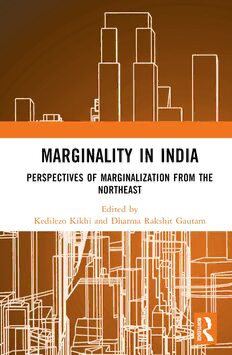
Marginality in India: Perspectives of Marginalisation from the Northeast PDF
Preview Marginality in India: Perspectives of Marginalisation from the Northeast
Marginality in India Marginality in India is not an unusual phenomenon when compared with the other cultures of the globe; however, its sustainability on the primordial basis highlights the peculiarities that make India a classic example. In fact, the present liberalised scenario though has bestowed opportunities, but the scope of affirmative action too has mar- ginalised leading to the status quo to a larger extent. There are social categories such as caste, ethnicity, religion, gender, etc. which are stratified (mostly in vertical order) to transform the development process into the process of marginalisation for many while benefitting the privileged few. The context of the northeast presents a unique example due to prolong colonial historical experience that has alienated the region from the rest of India, and due to multi-ethnic cultures. There are several identities which are either bruised or are still vulnerable, seeking protection of affirmative action policies vis-à-vis other (dominant) identities in their local as well as national context. The discussion on several aspects of marginality and the process of marginalisation in India with some special insights from the northeast region attempts to generate a relevant discourse towards undoing of the marginality, especially on the social as well as cultural stratification. Kedilezo Kikhi is currently Chair Professor, Dr. Ambedkar Chair, and Professor of Sociology at Tezpur University, Assam, India. He completed his post-graduate degree and PhD from North Eastern Hill University (NEHU), Shillong, India. He is credited with several publications in national and international journals, dailies, texts, and reference books for tertiary as well as school education. His most recent publications include Nagaland: Vibrant Ethnic Communities in Transition (Vol. 1&2), Indigeneity, Citizenship and the State: Perspectives from India’s Northeast, and Comprehending Equity: Contextualising India’s North-East. Dharma Rakshit Gautam is currently Research Officer and Assistant Professor, Dr. Ambedkar Chair at Tezpur University, Assam, India. He completed his post-graduate degree at Jawaharlal Nehru University (JNU), New Delhi, India, and earned research degrees (MPhil and PhD) from the National Institute of Educational Planning & Administration (NIEPA), New Delhi, India. His recent publications include Education Among Scheduled Castes and Comprehending Equity: Contextualising India’s North-East. Marginality in India Perspectives of Marginalisation from the Northeast Edited by Kedilezo Kikhi and Dharma Rakshit Gautam First published 2023 by Routledge 4 Park Square, Milton Park, Abingdon, Oxon OX14 4RN and by Routledge 605 Third Avenue, New York, NY 10158 Routledge is an imprint of the Taylor & Francis Group, an informa business © 2023 selection and editorial matter, Kedilezo Kikhi and Dharma Rakshit Gautam; individual chapters, the contributors The right of Kedilezo Kikhi and Dharma Rakshit Gautam to be identified as the authors of the editorial material, and of the authors for their individual chapters, has been asserted in accordance with sections 77 and 78 of the Copyright, Designs and Patents Act 1988. All rights reserved. No part of this book may be reprinted or reproduced or utilised in any form or by any electronic, mechanical, or other means, now known or hereafter invented, including photocopying and recording, or in any information storage or retrieval system, without permission in writing from the publishers. Trademark notice: Product or corporate names may be trademarks or registered trademarks, and are used only for identification and explanation without intent to infringe. British Library Cataloguing-in-Publication Data A catalogue record for this book is available from the British Library ISBN: 978-1-032-02210-9 (hbk) ISBN: 978-1-032-24666-6 (pbk) ISBN: 978-1-003-27967-9 (ebk) DOI: 10.4324/9781003279679 Typeset in Sabon by Deanta Global Publishing Services, Chennai, India Dedicated to Prof. A.K. Nongkynrih (NEHU) and Dr. P. Anbarasan (Tezpur University), who (in their own unique way), have made an immortal contribution towards the struggle for socio-economic equality. Recently, their souls have departed the mortal world. Contents List of figures x List of tables xii List of contributors xiii Preface xv Acknowledgements xx 1 Marginality in India: An Introduction 1 KEDILEZO KIKHI AND DHARMA RAKSHIT GAUTAM SECTION 1 Marginalisation: Concept and the Categories 15 2 Schema for Exploring Social Exclusion and Marginality in Northeast India 17 VIRGINIUS XAXA 3 Understanding Epistemic Agency in Indian Academia 32 N. SUKUMAR 4 Discursive Practices-Led Marginalisation: The Context of Caste-Based Spiral of Silence 45 P. ANBARASAN 5 Social Acceptability of Transgender Persons in a Traditional Society: The Case of Manipur 55 M.C. ARUNKUMAR viii Contents SECTION 2 Education: Source and Means for Marginalisation 63 6 Marginality and Marginalisation: Education as a Source of Cumulative Marginalisation 65 N.V. VARGHESE 7 Marginalisation of Scheduled Tribes in Educational Institutions: A Case of Shrinking Public Sphere 82 PARAMA CHAKMA AND RAJEEV DUBEY 8 Rural Space: An Endemic Problem of Cultural Subordination and Othering 95 AJAY KUMAR CHOUBEY 9 Structural Marginalisation of Transgender Students in Higher Education Institutions of India 110 S. AROKIA MARY SECTION 3 Identity: Standpoint Perspectives 127 10 Borders and the Construction of Citizenship in India 129 SHAILAJA MENON 11 Identity and Aporia of Autonomy: The Bodo Movement in Retrospect 142 BHUPEN SARMAH 12 Governance and Belonging in the Margins: A Centre– Periphery Perspective in India’s Northeastern Region 158 PAHI SAIKIA AND ANIRUDDHA KUMAR BARO 13 Identity and Marginalisation: The Darjeeling Hills in Context 172 RAMESH DURAL 14 Pre-emptive Criminalisation and Marginalisation of the Nagas 184 VISAKHONU HIBO 15 Discourse of Assamese Nationalism: Situating the Miyas of Assam 196 PRAFULLA KR. NATH Contents ix 16 Systemic Corruption: Phenomenon Ensuing Marginalisation of Tribals in Manipur 210 KH. POU AND VANTHANGPUI KHOBUNG 17 Narrating the Northeast: Contextualising Media-Led Marginality 225 PIYASHI DUTTA SECTION 4 Gender: Existing Stereotypes for Subordination 237 18 Professional Education in India: Exploring the Gendered Dimension 239 SANGHAMITRA DAS 19 Patronising Laws and Zealous Implementers: Women, Sex Industry, and Anti-Trafficking Discourse in Assam 259 SAWMYA RAY 20 Marginality and Legal Pluralism: An Intersection of Article 371A, Naga Women, and the Urban Local Body (ULB) Imbroglio 272 A. WATI WALLING AND RENCHUMI KIKON KUOTSU Index 289
